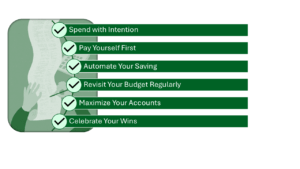Saving money doesn’t have to feel like a struggle, even on a tight budget. By using smart strategies and building healthy financial habits, you can make steady progress without feeling overwhelmed. Every small step counts, and over time, those little wins can lead to greater financial confidence and security.
What Does a Personal Budget Look Like?
A personal budget is a clear, specific, and easy-to-read breakdown of your income and expenses, typically over a month. It should be tailored to your individual goals and lifestyle.
Budgets help you track spending, plan for future expenses, and make informed financial decisions, whether you’re saving for college, paying off debt, or investing for retirement.
Rather than flying blind with vague estimates, a good budget acts as a practical guide for your daily spending. It helps you stay on track and be financially prepared.
Here are some practical tips for a budget of any size:
Spend with Intention
Start by covering the essentials (housing, food, utilities, and transportation) before spending on non-essentials like takeout or subscriptions. Cut what you don’t use. Then, structure your budget around needs, then wants, with room for savings or debt payments.
Track every expense accurately, especially in the beginning. Whether you use an app, spreadsheet, or notebook, knowing where your money goes helps you adjust your budget and stay on track to meet your financial goals.
Pay Yourself First
Decide how much you can realistically save each month. A good starting point is the 50/30/20 rule: 50% for needs, 30% for wants, and 20% for savings and debt.
Treat savings like a bill. Pay yourself first and set aside money before covering other expenses. Start small if you need to; consistency matters more than the amount. As your income grows, try to increase your savings over time.
Set clear, achievable goals and break them into smaller milestones to stay motivated. Whether you’re building an emergency fund or saving for something big, the key is to start and stick with it.
Automate Your Saving
Since you’ve established a set amount to save each month, why not automate it? Set up automatic transfers on a specific date to move that money from your checking account to your savings account.
You can also use direct deposit to have part of your paycheck go straight into your savings. Automating how you save helps you consistently build your savings without having to think about it.
Revisit Your Budget Regularly
Your budget should evolve with your life, so it’s important to review it at least once a month to keep it accurate and effective. Before making any updates, think about recent or upcoming changes that could affect your income or expenses, such as paying off a loan, starting a new job, or moving.
These regular check-ins help you track your progress, adjust for shifting priorities, and spot areas where you may be overspending. By making thoughtful updates, you ensure your budget stays aligned with your financial goals and continues to support your current needs.
Maximize Your Accounts
One of the best budgeting tips is to understand how to make your financial accounts work for you. Letting your money sit in low-interest accounts can slow down your financial growth.
Consider using tools like the Coin Catcher Savings Account, which rounds up your transactions and helps save the spare change automatically.
Look into high-yield Certificate Accounts or Money Market Accounts that offer better interest rates than traditional savings accounts. These accounts help your money grow faster without extra effort.
When choosing an account, compare options for competitive interest rates, low or no minimum balances, and helpful features like ATM access or budgeting tools to find the best fit for your needs.
Celebrate Your Wins
Building savings and mastering your budget is a journey, not a sprint. It takes time, patience, and consistency. That’s why it’s important to celebrate your wins, no matter how small they seem. Did you save an extra $20 this week? Manage to cut back on takeout? Pay off a bit of debt? These victories add up and bring you closer to your financial goals.
Focusing on the long term helps you stay motivated when progress feels slow. Every dollar saved and every smart decision you make builds momentum for a stronger, more secure financial future.
So, don’t forget to reward yourself now and then with a little celebration, such as a favorite snack, a movie night, or even just a moment to appreciate how far you’ve come.
And hey, if budgeting was easy, we wouldn’t be here cheering you on every step of the way. Keep up the great work, because your financial glow-up is just getting started!

